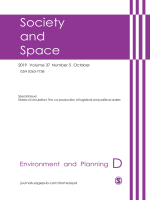Where Amazon doesn’t deliver at the doorstep
Container ships, just-in-time production, door-to-door delivery and track and trace: logistics is the invisible fabric that stitches together a thoroughly globalized economy. It is increasingly becoming clear that logistics is not only about the mundane art of organizing circulation. The way that global flows are organized also has huge implications for how particular places and people are included in this world of flows. It turns out that the world of next-day-delivery that Amazon made is one of exceedingly precarious employment and an erosion of labor rights.
Studies of what has been called ‘supply chain capitalism’ have made great strides in uncovering the politics of logistics in the advanced world. However, the majority of people still live in a world where container shipping is an abstract concept and where transport infrastructure is deteriorating.Yet paradoxically, global supply chains today also extend to these peripheries of logistical networks. Over sixty percent of all labor is informal, ranging from sweatshops of seamstresses in India and truckers in Chile to illicit artisanal miners in Congo, vast invisible armies of informal workers are today’s ‘foot soldiers of globalization’. How do global supply chains work at these vast global margins?
Edited by DIIS researchers Finn Stepputat and Peer Schouten with Jan Bachmann (University of Gothenburg), a new special issueexplores the politics of logistics in places where Amazon doesn’t deliver at the doorstep. Published in Environment and Planning D: Society and Space, the special issue brings together eight explorations of what makes things move in the global margins. With case studies from four continents, the collection explores the politics of circulation in the margins across four continents, ranging from Burmese mountain ranges to Central African savannahs and from failing infrastructure schemes in the Colombian Amazon to marginal West African seaports. As it turns out, the global margins brim with logistical life. Smugglers, peddlers, independent truckers, women selling cassava tubers at local markets and elephant riders turn out to be just as skilled logistical entrepreneurs as the high-paid experts of multinational transport companies, and they have the same aspirations to overcome frictions, eliminate middlemen, strike deals with those who carry weapons, and increase profits over distance.
The (open access) introductionforwards the idea that including the margins in the study of the politics of logistics opens up a productive space where anthropology can be brought into conversation with the insights from critical geography to arrive at a picture of circulation as a politics central to ways of living—even in places where “multi-modal transport” extends across bicycles, second-hand cars, canoes, and, more often than not, porterage or animal conveyance.
DIIS Eksperter


